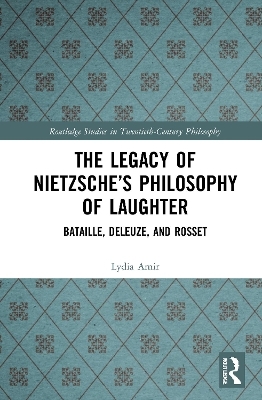
The Legacy of Nietzsche’s Philosophy of Laughter
Bataille, Deleuze, and Rosset
Seiten
2024
Routledge (Verlag)
978-1-032-02138-6 (ISBN)
Routledge (Verlag)
978-1-032-02138-6 (ISBN)
This book investigates the role of humor in the good life, specifically as discussed in three prominent French intellectuals who were influenced by Nietzsche's thought: Georges Bataille, Gilles Deleuze, and Clément Rosset.
This book investigates the role of humor in the good life, specifically as discussed by three prominent French intellectuals who were influenced by Nietzsche's thought: Georges Bataille, Gilles Deleuze, and Clément Rosset. Lydia Amir begins by discussing Nietzsche’s reception in France, and she explains why and how he came to be considered a "philosopher of laughter" in the French academe. Each of the subsequent three chapters focuses on the significance of humor and laughter in the good life as advocated by Bataille, Deleuze, and Rosset. These chapters also explore the complex relationship between the comic and the tragic, and of humor and laughter to irony, satire, and ridicule. The Legacy of Nietzsche’s Philosophy of Laughter makes an invaluable contribution to recent interpretive work done on Bataille and Deleuze, and offers further introduction to the relatively understudied Rosset. It illuminates the philosophies of these three thinkers, their connection to Nietzsche, and, overall, the significant role that humor plays in philosophy.
This book investigates the role of humor in the good life, specifically as discussed by three prominent French intellectuals who were influenced by Nietzsche's thought: Georges Bataille, Gilles Deleuze, and Clément Rosset. Lydia Amir begins by discussing Nietzsche’s reception in France, and she explains why and how he came to be considered a "philosopher of laughter" in the French academe. Each of the subsequent three chapters focuses on the significance of humor and laughter in the good life as advocated by Bataille, Deleuze, and Rosset. These chapters also explore the complex relationship between the comic and the tragic, and of humor and laughter to irony, satire, and ridicule. The Legacy of Nietzsche’s Philosophy of Laughter makes an invaluable contribution to recent interpretive work done on Bataille and Deleuze, and offers further introduction to the relatively understudied Rosset. It illuminates the philosophies of these three thinkers, their connection to Nietzsche, and, overall, the significant role that humor plays in philosophy.
Lydia Amir is Visiting Professor of Philosophy at Tufts University, USA. She is the author of Humor and the Good Life: Shaftesbury, Hamann, Kierkegaard (2014), and Rethinking Philosophers' Responsibility (2017). She is the Founding-President of the International Association for the Philosophy of Humor, and editor of the Israeli Journal of Humor Research: An International Journal.
Introduction
Prologue: The French Reception of Nietzsche As a Philosopher of Laughter
1. Georges Bataille: The Laughter of Ecstasy
2. Gilles Deleuze: The Humor of Affirmation
3. Clément Rosset: The Laughter of Annihilation
4. Concluding Remarks: Additional French Twentieth-Century Views of Laughter
| Erscheinungsdatum | 14.11.2023 |
|---|---|
| Reihe/Serie | Routledge Studies in Twentieth-Century Philosophy |
| Verlagsort | London |
| Sprache | englisch |
| Maße | 152 x 229 mm |
| Gewicht | 684 g |
| Themenwelt | Geisteswissenschaften ► Philosophie ► Ethik |
| Geisteswissenschaften ► Philosophie ► Philosophie der Neuzeit | |
| ISBN-10 | 1-032-02138-1 / 1032021381 |
| ISBN-13 | 978-1-032-02138-6 / 9781032021386 |
| Zustand | Neuware |
| Haben Sie eine Frage zum Produkt? |
Mehr entdecken
aus dem Bereich
aus dem Bereich


